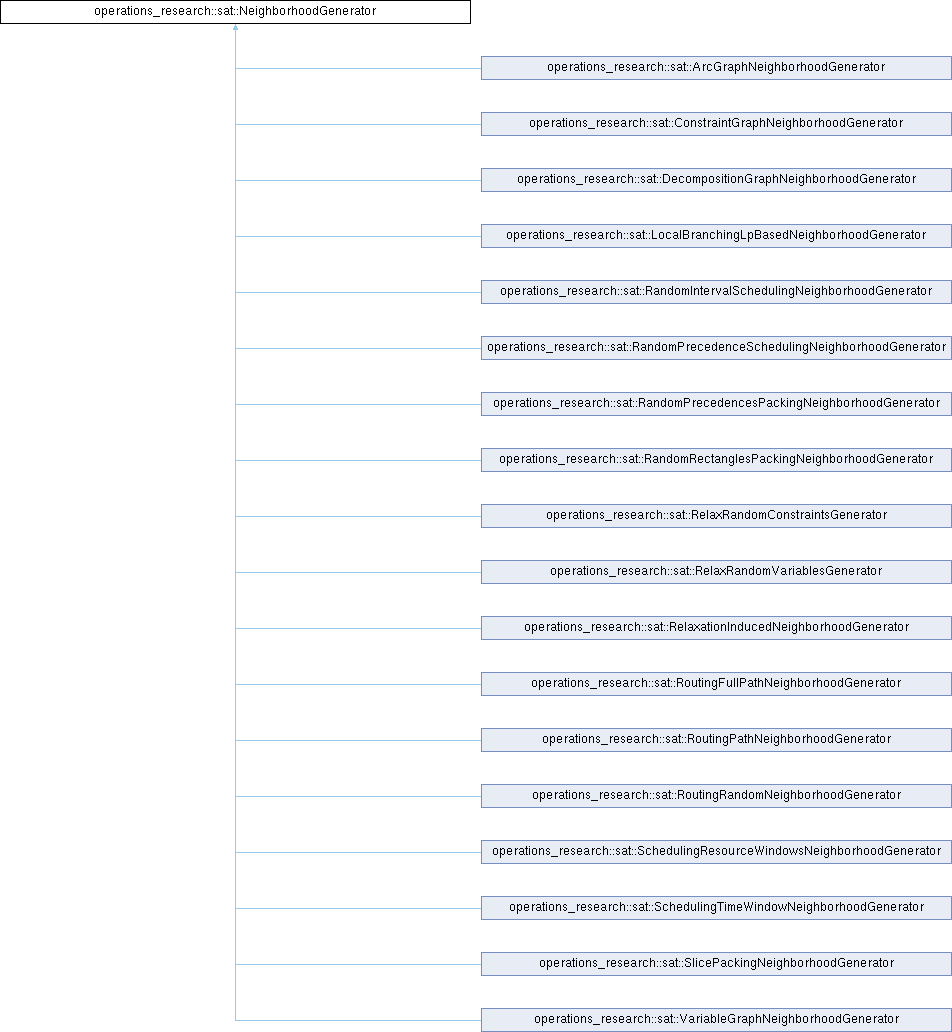Definition at line 388 of file cp_model_lns.h.
#include <cp_model_lns.h>
◆ ActiveRectangle
◆ NeighborhoodGenerator()
| operations_research::sat::NeighborhoodGenerator::NeighborhoodGenerator |
( |
absl::string_view | name, |
|
|
NeighborhoodGeneratorHelper const * | helper ) |
|
inline |
◆ ~NeighborhoodGenerator()
| virtual operations_research::sat::NeighborhoodGenerator::~NeighborhoodGenerator |
( |
| ) |
|
|
virtualdefault |
◆ AddSolveData()
| void operations_research::sat::NeighborhoodGenerator::AddSolveData |
( |
SolveData | data | ) |
|
|
inline |
◆ deterministic_limit()
| double operations_research::sat::NeighborhoodGenerator::deterministic_limit |
( |
| ) |
const |
|
inline |
◆ difficulty()
| double operations_research::sat::NeighborhoodGenerator::difficulty |
( |
| ) |
const |
|
inline |
◆ Generate()
Implemented in operations_research::sat::ArcGraphNeighborhoodGenerator, operations_research::sat::ConstraintGraphNeighborhoodGenerator, operations_research::sat::DecompositionGraphNeighborhoodGenerator, operations_research::sat::LocalBranchingLpBasedNeighborhoodGenerator, operations_research::sat::RandomIntervalSchedulingNeighborhoodGenerator, operations_research::sat::RandomPrecedenceSchedulingNeighborhoodGenerator, operations_research::sat::RandomPrecedencesPackingNeighborhoodGenerator, operations_research::sat::RandomRectanglesPackingNeighborhoodGenerator, operations_research::sat::RectanglesPackingRelaxOneNeighborhoodGenerator, operations_research::sat::RectanglesPackingRelaxTwoNeighborhoodsGenerator, operations_research::sat::RelaxationInducedNeighborhoodGenerator, operations_research::sat::RelaxRandomConstraintsGenerator, operations_research::sat::RelaxRandomVariablesGenerator, operations_research::sat::RoutingFullPathNeighborhoodGenerator, operations_research::sat::RoutingPathNeighborhoodGenerator, operations_research::sat::RoutingRandomNeighborhoodGenerator, operations_research::sat::SchedulingResourceWindowsNeighborhoodGenerator, operations_research::sat::SchedulingTimeWindowNeighborhoodGenerator, operations_research::sat::SlicePackingNeighborhoodGenerator, and operations_research::sat::VariableGraphNeighborhoodGenerator.
◆ GetUCBScore()
| double operations_research::sat::NeighborhoodGenerator::GetUCBScore |
( |
int64_t | total_num_calls | ) |
const |
◆ name()
| std::string operations_research::sat::NeighborhoodGenerator::name |
( |
| ) |
const |
|
inline |
◆ num_calls()
| int64_t operations_research::sat::NeighborhoodGenerator::num_calls |
( |
| ) |
const |
|
inline |
◆ num_consecutive_non_improving_calls()
| int64_t operations_research::sat::NeighborhoodGenerator::num_consecutive_non_improving_calls |
( |
| ) |
const |
|
inline |
◆ num_fully_solved_calls()
| int64_t operations_research::sat::NeighborhoodGenerator::num_fully_solved_calls |
( |
| ) |
const |
|
inline |
◆ num_improving_calls()
| int64_t operations_research::sat::NeighborhoodGenerator::num_improving_calls |
( |
| ) |
const |
|
inline |
◆ ReadyToGenerate()
| bool operations_research::sat::NeighborhoodGenerator::ReadyToGenerate |
( |
| ) |
const |
|
virtual |
◆ Synchronize()
| absl::Span< const double > operations_research::sat::NeighborhoodGenerator::Synchronize |
( |
| ) |
|
◆ deterministic_limit_
| double operations_research::sat::NeighborhoodGenerator::deterministic_limit_ = 0.1 |
|
protected |
◆ generator_mutex_
| absl::Mutex operations_research::sat::NeighborhoodGenerator::generator_mutex_ |
|
mutableprotected |
◆ helper_
◆ name_
| const std::string operations_research::sat::NeighborhoodGenerator::name_ |
|
protected |
The documentation for this class was generated from the following files:


